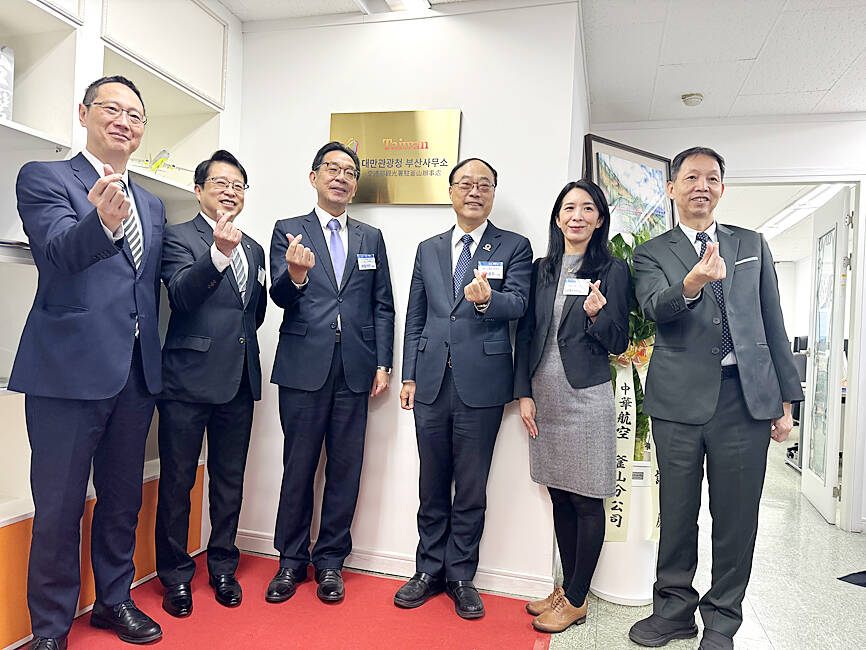The Tourism Administration on Monday opened a new office in Busan, hoping to draw visitors from southern South Korea to Taiwan and help push the number of South Korean arrivals back to the levels from prior to the COVID-19 pandemic.
At the opening ceremony, Tourism Administration Director-General Chou Yung-hui (周永暉) said that the new office would send Taiwan-South Korea tourism exchanges to new heights by promoting Taiwan’s culture, cruises and foods to prospective visitors in Busan and nearby areas.
About 550,000 South Korean passport holders visited Taiwan in the first 10 months of this year, making it the third-largest source of foreign arrivals, Tourism Administration data showed.

Photo courtesy of Tourism Administration
However, that number is only about 65 percent of what it was in 2019, the last full year before the pandemic, when there were 1.24 million overseas arrivals from South Korea, the data showed.
Outbound travel by Taiwanese to South Korea has rebounded to about 90 percent of pre-COVID-19 levels in the past five months, the data showed.
The Busan office would offer tourism services and information for people in the four southern Korean metropolitan areas of Busan, Daegu, Gwangju and Ulsan, and other southern provinces, the Tourism Administration said.
Its main tasks would be to promote Taiwan as a tourist destination and attract more South Korean tourists from the nation’s south, it said.
The office would also work with travel agencies and airlines to promote Taiwan to independent travelers through forums, international tourism events, and multimedia advertising and promotional events, it said.
During the opening ceremony, several incentives and preferential offers were rolled out to lure potential tourists, including accommodation discount coupons worth NT$5,000 each.
The Busan office is Taiwan’s second tourism office in South Korea after a Seoul office.

Taipei, New Taipei City, Keelung and Taoyuan would issue a decision at 8pm on whether to cancel work and school tomorrow due to forecasted heavy rain, Keelung Mayor Hsieh Kuo-liang (謝國樑) said today. Hsieh told reporters that absent some pressing reason, the four northern cities would announce the decision jointly at 8pm. Keelung is expected to receive between 300mm and 490mm of rain in the period from 2pm today through 2pm tomorrow, Central Weather Administration data showed. Keelung City Government regulations stipulate that school and work can be canceled if rain totals in mountainous or low-elevation areas are forecast to exceed 350mm in

EVA Airways president Sun Chia-ming (孫嘉明) and other senior executives yesterday bowed in apology over the death of a flight attendant, saying the company has begun improving its health-reporting, review and work coordination mechanisms. “We promise to handle this matter with the utmost responsibility to ensure safer and healthier working conditions for all EVA Air employees,” Sun said. The flight attendant, a woman surnamed Sun (孫), died on Friday last week of undisclosed causes shortly after returning from a work assignment in Milan, Italy, the airline said. Chinese-language media reported that the woman fell ill working on a Taipei-to-Milan flight on Sept. 22

COUNTERMEASURE: Taiwan was to implement controls for 47 tech products bound for South Africa after the latter downgraded and renamed Taipei’s ‘de facto’ offices The Ministry of Foreign Affairs is still reviewing a new agreement proposed by the South African government last month to regulate the status of reciprocal representative offices, Minister of Foreign Affairs Lin Chia-lung (林佳龍) said yesterday. Asked about the latest developments in a year-long controversy over Taiwan’s de facto representative office in South Africa, Lin during a legislative session said that the ministry was consulting with legal experts on the proposed new agreement. While the new proposal offers Taiwan greater flexibility, the ministry does not find it acceptable, Lin said without elaborating. The ministry is still open to resuming retaliatory measures against South

1.4nm WAFERS: While TSMC is gearing up to expand its overseas production, it would also continue to invest in Taiwan, company chairman and CEO C.C. Wei said Taiwan Semiconductor Manufacturing Co (TSMC) has applied for permission to construct a new plant in the Central Taiwan Science Park (中部科學園區), which it would use for the production of new high-speed wafers, the National Science and Technology Council said yesterday. The council, which supervises three major science parks in Taiwan, confirmed that the Central Taiwan Science Park Bureau had received an application on Friday from TSMC, the world’s largest contract chipmaker, to commence work on the new A14 fab. A14 technology, a 1.4 nanometer (nm) process, is designed to drive artificial intelligence transformation by enabling faster computing and greater power